Minsk Forum XX – Vilnius: Civil society, business and education in exile: Implications for Europe
Minutes of three panel discussions and three group discussions
I. Perspectives of Belarusian civil society across borders
Three group discussion: Belarusian agenda in the face of the war in Ukraine and mass repression
II. Economy in Exile: Status Quo and Ways of Development
III. Education in Belarus: Between European Integration and Russian Colonisation
Perspectives of Belarusian civil society across borders
The first event was held in a hybrid format on 22 July in Vilnius at the Imaguru Startup Hub and included, among other activities, three panel discussions. The event was streamed live. The recordings are available in Russian and English on the german-belarusian society’s YouTube channel.
The welcoming speeches focused on two key messages. On the one hand, speakers referred to the crisis in which Belarus has found itself due to internal and external political processes:
‘As a society, we were not prepared to assume such responsibility’. — Alexander Dabravolski, Advisor to Sviatlana Tsikhanouskaya, Head of the Internal Policy Department
‘Belarus supports Russia logistically and propagandistically’. — Manfred Huterer, Ambassador of the Federal Republic of Germany in Belarus
‘We have all failed with respect to one criterion — Lukashenko is still in power’
Petras Auštrevičius, member of the European Parliament (Renew Europe, Lithuania)
On the other hand, a need for reflection and a search for solutions to the current crisis were voiced:
‘I would like us to look at civil society, business, politics, education through the lens of undiscovered potential, rather than crisis’.
Hanna Stähle, Chairwoman of the Board of the deutsch-belarussische gesellschaft e.V.
‘Belarusians abroad are involved in civic, social and business activities. All of them constitute amazing social and intellectual capital, which can and should be used not only for the future of Belarus, but also of the whole of Europe’.
Tania Marinich, Founder and CEO at Imaguru Startup Hub.
The first panel discussion addressed the perspectives of Belarusian civil society across borders. The participants were Andrej Stryzhak (Head of the BYSOL Solidarity Fund, human rights activist), Palina Brodik (Coordinator of the Free Belarus Center, Kyiv), Aliaksei Lukashevich (Project Manager, Belarusian Youth Hub, Warsaw) and Elena Zhivoglod (runs the Honest People initiative).
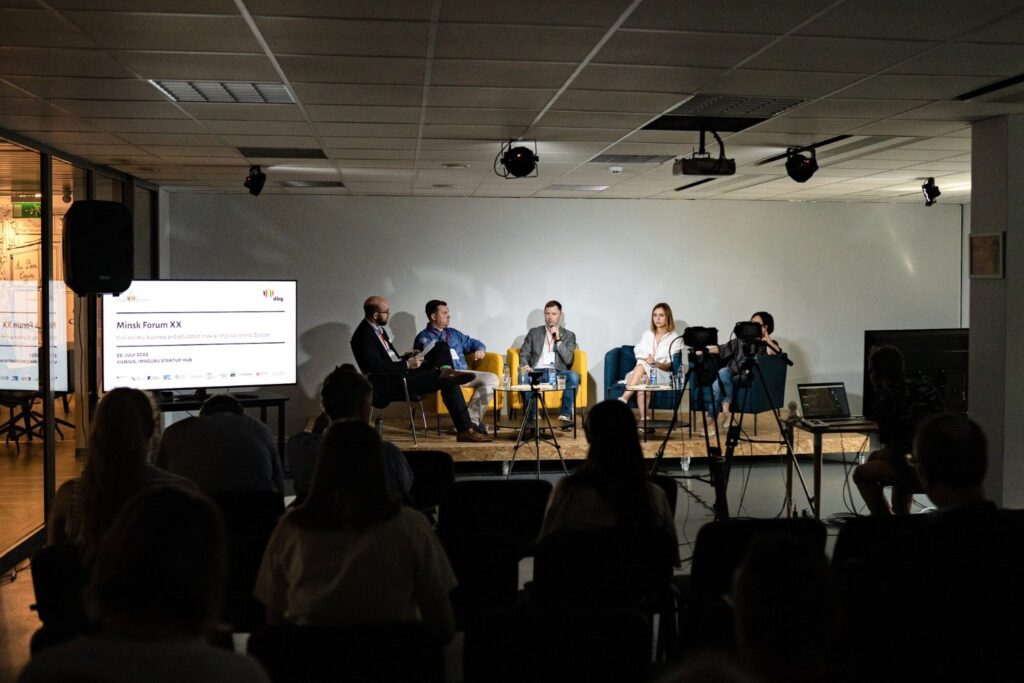
Ms Zhivoglod began her speech by disagreeing with the mainstream rhetoric about the complete destruction of Belarusian civil society inside the country, but pointed out the following important problems in its activity:
- lack of communication with the authorities, who still show no interest in solving simple everyday issues (e.g. at the level of an injured bird or damaged roads);
- lack of financial transparency in internal operations;
- difficulty in scaling up due to increasing risks (communities exist internally, while organisations operate externally).
She also drew attention to the need for a unifying value-based idea and highlighted the problem that in the current discourse, ‘everyone is discussing public figures rather than meanings — it sounds scary’. The figures were not named, but the reference was probably made to the II Forum of Belarusian Democratic Forces of Belarusian Democratic Forces that took place in Berlin ten days before the Minsk Forum XX and revealed serious conflicts within the community of political actors opposing Lukashenko. Another important point of Zhivoglod’s presentation was the role of diaspora organisations and structures which, in her view, often act as providers of humanitarian aid and pay insufficient attention to ‘posing ideas’ that address the aim of the struggle — and importantly, the struggle ‘for something’, rather than ‘against someone’.
Mr Stryzhak supported Zhivoglod’s point on the need to unite based on ideas, rather than adherence to public figures: ‘We are now at a point where we can either split up and have things go back to the usual way or come to an agreement’. To the question of Jakob Wöllenstein, head of the Belarus office of Konrad-Adenauer-Stiftung, who moderated the panel, as to what prevents the representatives of the opposition from reaching a consensus, Stryzhak replied that it is not a lack of communication or the need to create new communication platforms (‘More platforms for platforms god’), but rather the lack of interaction and the value base that can unite Belarusians and civil society.
Ms Brodik, for her part, did not talk much about the conflicts among opposition political leaders, but rather touched upon the role of grassroots initiatives and the potential of neophytes ‘that should be used, and new people should be brought into our circles’. She noted that professional communities often have few contacts with grassroots initiatives and are often disconnected from the real problems that people face on the ground, including the very humanitarian aid that Zhivoglod spoke of. Brodik also noted that, more often than not, she witnesses conversations about Belarus’ national interests, and, in her view, these interests are value-based and do not imply ‘over-focusing on ethnic categories’, but involve cooperation.
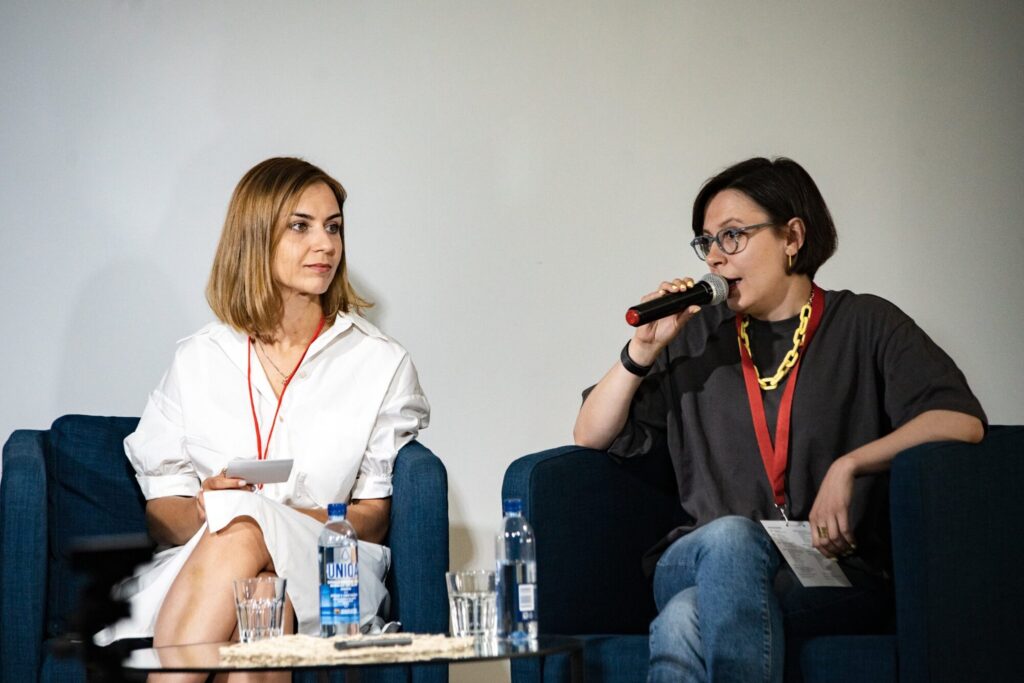
To sum up, all the speakers of the first panel brought up the theme of conflicts within the opposition community and considered it necessary to unite around ideas and meanings, rather than specific individuals. Hence the reasonable question — if everyone shares this idea in one way or another, why do conflicts still occur? And is there any chance that such a consolidating idea can be found and formulated? As of today, a unifying figure does exist and is personified by Svetlana Tikhanovskaya, but not everyone wants to unite around her — ideas and meanings get in the way.
Belarusian agenda in the face of the war in Ukraine and mass repression
The next section of the programme consisted of three group discussions. A 40-minute discussion was followed by a presentation of the debate outcomes by group representatives.
The first group discussed the drain of highly qualified professionals from Belarus. Their discussion resulted in identifying two main trends in the support of Belarusians who have left the country: short-term and long-term support programmes. Short-term ones help in adaptation (language courses, acquiring new professions, etc.) and outnumber the long-term programmes. Long-term programmes include individual internship and scholarship programmes for human rights defenders or people from the academy. The group also mentioned as an example the Armenian people, most of whom live outside their home country.


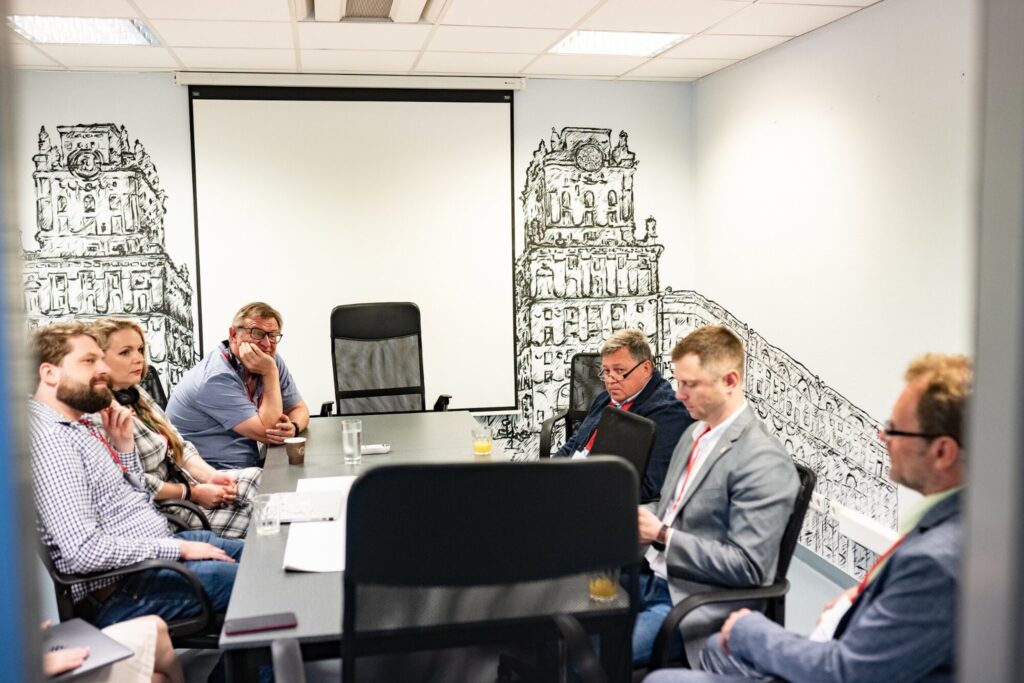
The second group talked about the expectations directed at the opposition and highlighted the ones that presumably exist:
- Tikhanovskaya can engage in a dialogue with Zelenski and Ukrainian authorities and explain to them the role of Belarus in the ongoing war;
- The framing of the anti-war movement;
- Tikhanovskaya is able to actually solve the problems of Belarusians abroad (visas, residence permits, etc.);
- Mobilisation of all democratic forces in the face of war.
The group also shared their thoughts on what would be the right thing to do:
- Have a clearly articulated position on the war, where one option is to express full support for Ukraine and refuse to side with Russia, and another is to promote the idea that Russia does not equal Putin, just like Belarus does not equal Lukashenko;
- Expressly communicate the values and choice of an independent Belarus;
- Mobilise civil society structures, headquarters, and democratic structures — and ‘lead the way’ in this effort;
- Improve interaction of ‘parallel realities’ — democratic structures, diasporas, and civil society within Belarus.
The third group pondered upon the way to explain to the international community that Belarusians do not support the war. The following ideas were voiced:
- Focus on the actions and efforts that Belarusians are making to hasten Ukraine’s victory: participation in military actions on the side of Ukraine, creation of Belarusian regiments, purchase of drones and medical supplies, etc.
- Reiterate that many Belarusians have not left Ukraine and continue their work and voluntary action under war conditions.
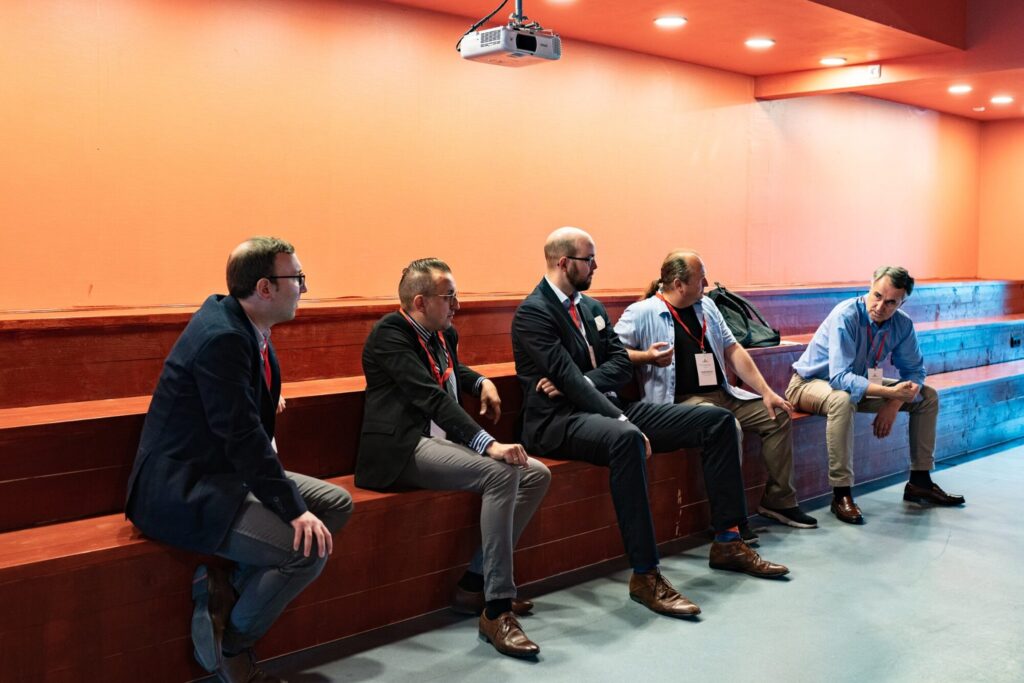
Economy in Exile: Status Quo and Ways of Development
The second panel discussion addressed business in exile. The participants were Tania Marinich (Founder and CEO at Imaguru Startup Hub), Valery Tsepkalo (Director of the Belarusian High Technology Park (2005-2017), 2020 presidential candidate) and Pavel Daneyko (Administrative Director at BEROC).
Ms Marinich noted that several waves of relocation have happened in the last two years. The first one was caused by repression, while the following surge was due to generally unfavourable conditions for work within Belarus. Among the challenges faced by startups in relocation, she named the following:
- Regularisation of stay (visas, travel permits for family members, medical insurance);
- Reputation: partners refuse to cooperate with Belarusian passport-holders, banks freeze and refuse new accounts, access to acceleration programmes is restricted, etc.;
- Building new ecosystems.
Mr Daneyko spoke of several waves of business relocation from independent Belarus — in the 1990s, 2005, 2014-2015, and the current one. He considers the latest wave the most powerful and predicts that it will take about two years for the infrastructure of the relocated businesses to take shape.
Mr Tsepkalo pointed out that the demonstration of (non-)support for Belarusian business varies depending on the country. For example, in Poland, interaction with local authorities is quite uncomplicated, in his opinion, and the conditions for regularisation can be described as favourable. In Germany, the situation is complicated by the fact that in order to get the so-called “blue card”, people need a sufficiently high income, which is possible only for experienced professionals — “seniors”. Thus, “middles” and “juniors” cannot choose Germany as the country of relocation. In Lithuania, according to Tsepkalo, the situation was better during the first year following the elections, but later, when the influx of people who wanted to move increased, the Lithuanian authorities started ‘squirming’ and helping less willingly. However, the most vulnerable group, according to Tsepkalo, are those who stay in Belarus, cannot use European accounts and are obliged to pay tax money to the state treasury.
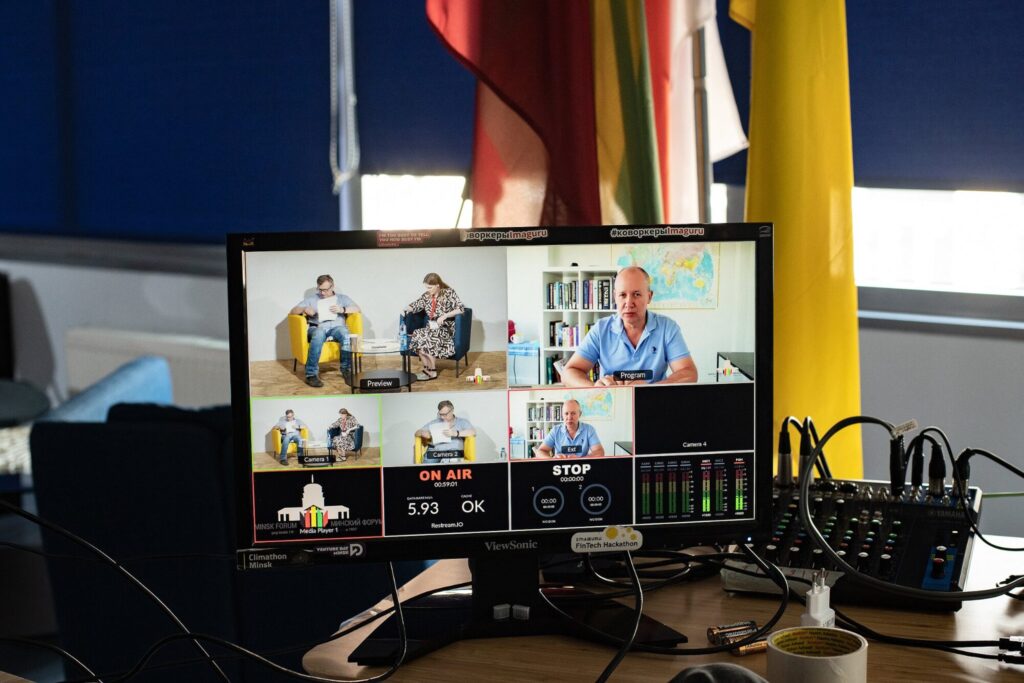
Despite all the problems highlighted by the experts, it is important to note that of all professional communities that have to relocate, IT specialists have the most privileges and, due to the specific nature of their job, can generally settle in a new place much easier and faster than culture and education or factory workers, for example.
Education in Belarus: Between European Integration and Russian Colonisation
The third — and the last— panel discussion was dedicated to education in Belarus. The participants were Tatiana Shchyttsova (Office of Sviatlana Tsikhanouskaya, Representative on Education and Science, Professor at European Humanities University), Pavel Tereshkovich (Professor, member of the Public Bologna Committee), Marianne Sakalova (Education expert, Education Office for New Belarus, consultant at Belarus Beehive project), Kamil Kłysiński (Senior Fellow, Department for Ukraine, Belarus and Moldova, Centre for Eastern Studies).
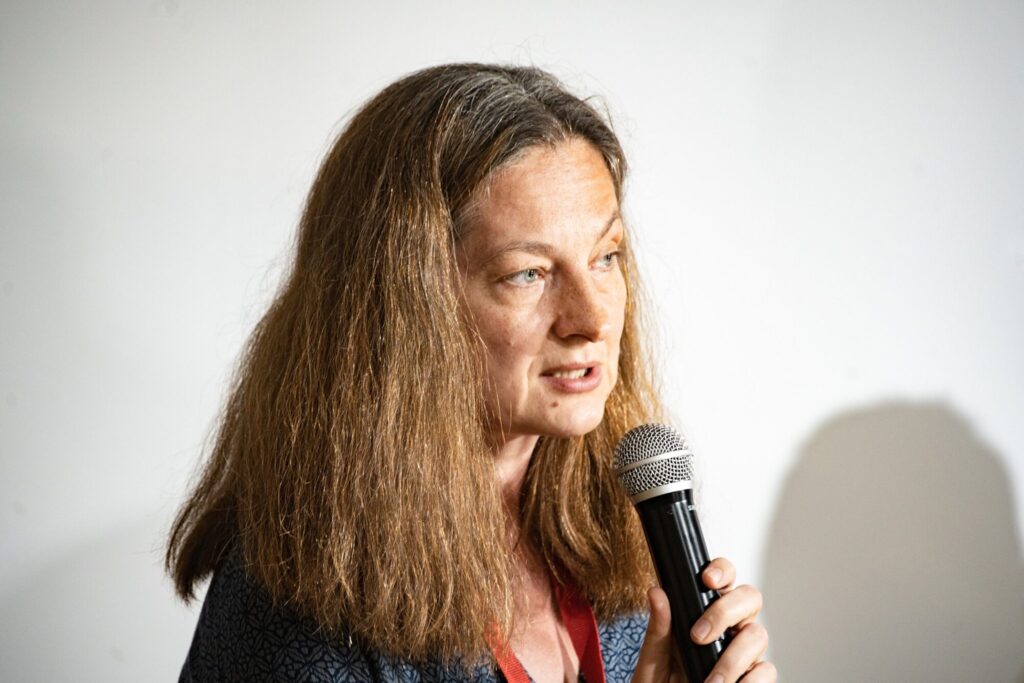
In his opening remarks, the moderator of the discussion Andrei Laurukhin (Belarusian Institute for Strategic Studies (BISS), senior analyst, expert on education, science and innovation) identified the following trends in Belarusian education:
- Isolation from the West — suspension of programmes, detachment from educational policy instruments, including the Bologna Process; shutting down of the Goethe Institute, the German Academic Exchange Service DAAD, and other educational institutions in Belarus;
- Emergence of favourable conditions for eastern integration (Russia), including forthcoming financial injections in this area.
Ms Shchyttsova presented the current situation in education and outlined the current effects and threats, possible perspectives and actions. In her presentation, she quoted the recent King’s College London’s research paper “Stumbling bear, soaring dragon: Russia, China and the geopolitics of global science”. She also highlighted the crucial importance of external support for the development of the humanities and outlined the programmes that have already been established and implemented (or are about to start) for this purpose, including for researchers based in Belarus.
Mr Tereshkovich recalled that Malta, Ireland and Belarus are the three countries in Europe that do not offer education in national languages.
Ms Sakalova reminded that the academic community now has few tools to influence the situation inside the country and suggested making preparations for education reform. A relevant reform project has already been developed by the Education Office for New Belarus.
Mr Kłysiński drew attention to the lack of feedback and exchange of information between the initiatives and organisations that currently work in education and assist the academic and student communities and voiced the idea of calling a special conference that could address this problem. The idea found a lively response — and this time without the irony of ‘more platforms for platforms god’.
Even though throughout these days, Belarusians (both in and out of the country) discussed arduously the way some participants of the democratic forces were blasting the others, and even despite the fact that representatives of these opposing camps seemed to be present at the forum events, a friendly atmosphere prevailed. Whether it was the fact that people tend to be more polite to each other offline, or the fact that they were tired of mutual recriminations and focused on ‘common success rather than strife’. Whether this can be achieved, time and new events will tell, including the next Minsk Forum meeting scheduled for 23 September 2022 in Warsaw. In the meantime, based on the results of the first meeting, we can say that Belarusian civil society, business and education, although with varying degrees of achievement, still continue their development already outside of Belarus and become an integral part of the socio-political landscape of the European Union.
by Vika Biran for the German-Belarusian Society, July 2022